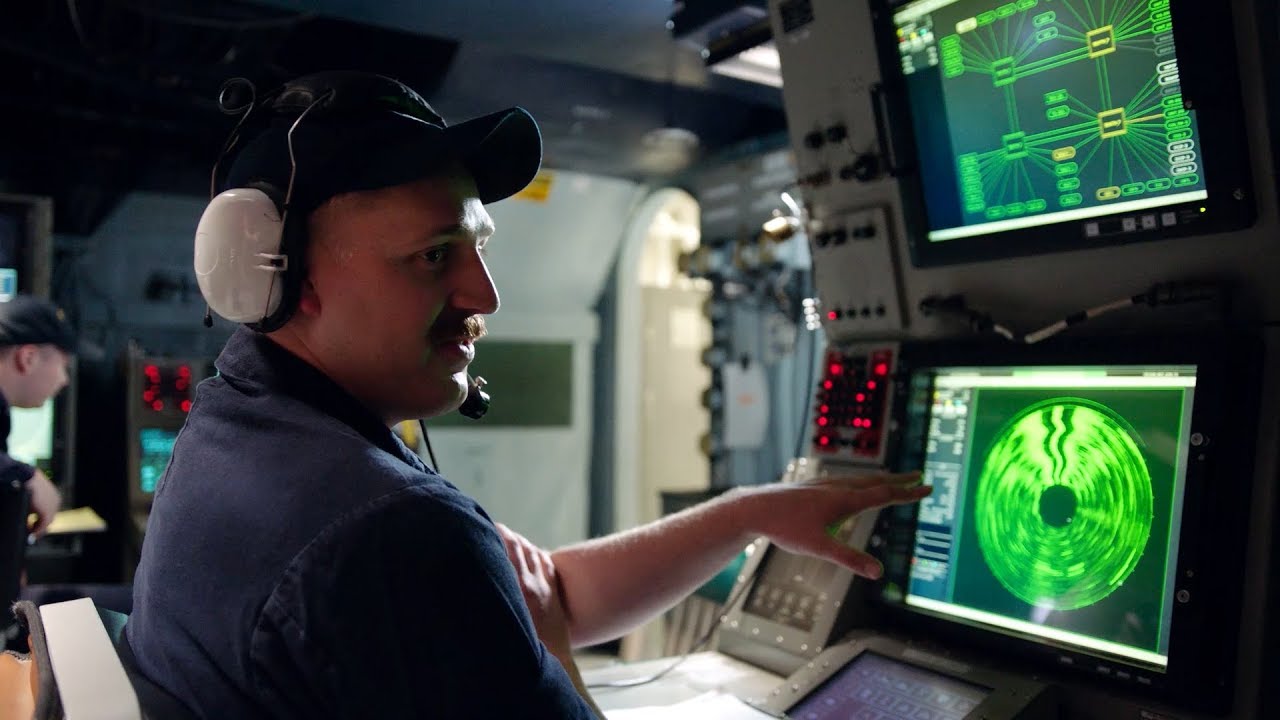What to Expect
More Information
Responsibilities
Sonar Technician Surface (STG)
- Identify sounds produced by surface ships, torpedoes, submarines, evasion devices, sonar transmissions, marine life and natural phenomena
- Operate sonar sensors for detection and classification of contacts
- Identify the characteristics, functions and effects of controlled jamming and evasive devices on sonar operations
- Prepare and interpret sonar messages
- Operate underwater fire control systems for firing of torpedoes
- Recognize major equipment malfunctions during sensor operations
- Operate bathythermographs, fathometers and torpedo countermeasures
- Use and maintain hand tools and portable power tools
- Operate underwater communications equipment
Sonar Technician Submarines (STS)
- Maintain, repair, calibrate, tune and adjust all electronic equipment used for underwater surveillance and scientific data collection
- Support operation and basic maintenance of underwater surveillance and scientific data collection systems
- Perform organizational and intermediate level maintenance on underwater surveillance and scientific data collection systems, equipment and associated combat control systems test equipment
- Operate & test underwater surveillance and scientific data collection systems
- Use and maintain hand tools and portable power tools
Work Environment
Whether you’re stationed on a ship or submarine for sea duty, or on land for shore duty, all Sonar Technicians can expect to work indoors in a comfortable shop-like atmosphere. You’ll work closely with others using the latest computer equipment with little supervision.
Training & Advancement
Upon completion of initial training at Recruit Training Command Great Lakes, (known as Boot Camp), those pursuing a Sonar Technician role will report to a technical “A” School based on their specific designation.
Sonar Technician Surface (STG)
Following Boot Camp, you’ll report to a Sonar Technician “A” School in San Diego, CA, for 10 weeks, where you’ll learn the fundamentals of sonar technology with basic operator and analyst skills. Once you complete that course, you’ll spend an additional 6-8 weeks taking a more in-depth sonar operator course. Then, you’ll start your career on a surface ship as a sonar operator—throughout your career you will alternate between service aboard a ship and shore duty on land.
Sonar Technician Submarines (STS)
After Boot Camp, you’ll report to Basic Enlisted Submarine School in Groton, CT, for 9 weeks where you’ll learn the basics of submarine systems. Immediately following, you’ll head to an advanced technical “A” School where you’ll learn the fundamentals of basic electricity, computer technology and electronics while preparing for underwater surveillance and scientific data collection aboard submarines. Once you’ve finished schooling, you’ll spend the rest of your career alternating between service at shore commands and aboard submarines in the U.S. and overseas.
Promotion opportunities are regularly available but competitive and based on performance.
Post-Service Opportunities
Specialized training received and work experience gained in the course of service can lead to valuable credentialing and occupational opportunities in related fields in the civilian sector:
Education Opportunities
Beyond offering access to professional credentials and certifications, Navy technical and operational training for a Sonar Technician can translate to credit hours toward a bachelor’s or associate degree through the American Council on Education.
You may also continue your education through undergraduate degree opportunities like the Navy College Program and Tuition Assistance and the Post-9/11 GI Bill.
Qualifications & Requirements
A high-school diploma or equivalent is required to become an Enlisted Sailor and Sonar Technician in the Navy. Those seeking this role must have good vision, excellent hearing and normal color perception. They must be skilled in arithmetic, speaking, writing and be able to excel at detailed work and keeping records. You should have an aptitude for science, electronics and technology as well as a strong memory. Sonar Technicians must have no speech impediments. Must be U.S. citizens and eligible for security clearances.
As an STS, you will be required to volunteer to serve aboard a submarine. You may be eligible for additional submarine duty pay based on your merit and time served.
General qualifications may vary depending upon whether you’re currently serving, whether you’ve served before or whether you’ve never served before.
Part-Time Opportunities
There are part-time opportunities available as a Sonar Technician.
Serving part-time as a Navy Reserve Sailor, your duties will be carried out during your scheduled drilling and training periods. During monthly drilling, Sonar Technicians (STS & STG) in the Navy Reserve typically work at a location close to their homes.
For annual training, Sonar Technicians may serve anywhere in the world, whether on a ship at sea or at bases and installations on shore.
Take a moment to learn more about the general roles and responsibilities of Navy Reserve Sailors.
Most of what you do in the Navy Reserve is considered training. The basic Navy Reserve commitment involves training a minimum of one weekend a month (referred to as drilling) and two weeks a year (referred to as Annual Training) – or the equivalent of that.
Sonar Technicians in the Navy Reserve serve in an Enlisted role. Before receiving the ongoing professional training that comes with the job, initial training requirements must be met.
For current or former military Enlisted servicemembers, prior experience satisfies the initial Recruit Training requirement, so you will not need to go through Boot Camp again.
For those without prior military experience, you will need to meet the initial Recruit Training requirement by attending Boot Camp in Great Lakes, IL. This training course will prepare you for service in the Navy Reserve and count as your first Annual Training.

































































































































